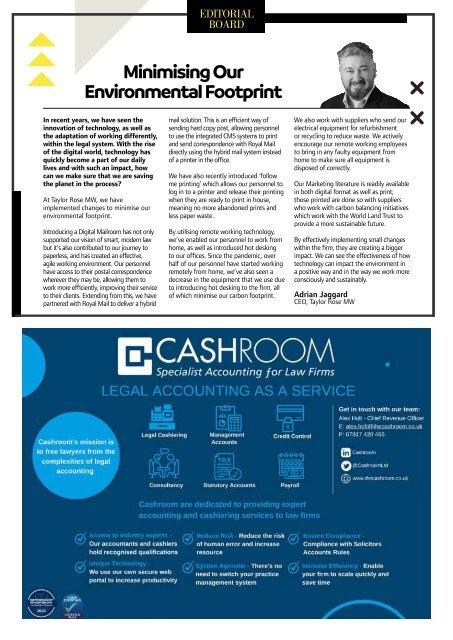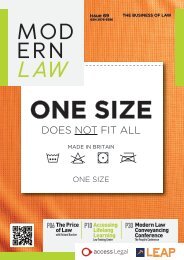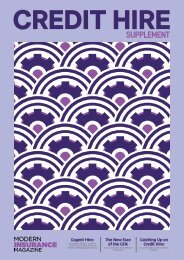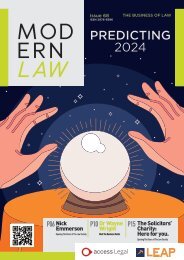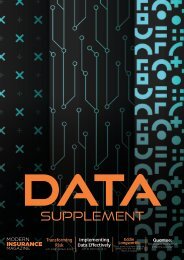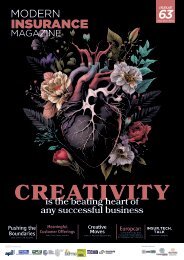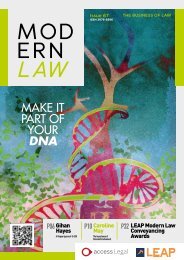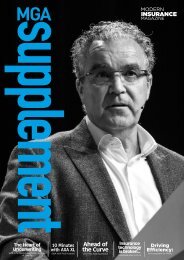Modern Law Magazine Issue 65
Interview: ‘Looking to the Future’, Eric Hunter. Interview: ‘Innovation Through Collaboration’, Electra Japonas. Interview: ‘The Intersection of A.I. and Law’, Raymond Sun. A Chat With… Ethan French, Iceberg. A Chat With… Peter Ross, Report Factory Insight: ‘Embracing Technology’, Savvas Skordellis, Deloitte. Insight: ‘Can We SustAIn It?’, Mercy Chirau, Womble Bond Dickson. Insight: ‘Collaborating On a Global Level’, Claudio Palmeri, PEXA. Insight: ‘Revolutionising the Legal Landscape’, Natasha Lewis, Duncan Lewis and YAO. Editorial Board of industry experts and thought leaders Feature: ‘From Memes to Hashtags: Why Lawyers Should Be Embracing Social Media’, Charlotte Lord. Feature: ‘Technology to Drive Sales for Law Firms’, Hannah Ajikawo. Feature: ‘LegalTech, Pricing Pressure and Emerging Technologies’, Lauren Watson Private Client Awards Personal Injury Roundtable Conference: Bold Legal Summer Conference 2023 Conveyancing Forum 10 Mins With… Hannah Ford.
Interview: ‘Looking to the Future’, Eric Hunter.
Interview: ‘Innovation Through Collaboration’, Electra Japonas.
Interview: ‘The Intersection of A.I. and Law’, Raymond Sun.
A Chat With… Ethan French, Iceberg.
A Chat With… Peter Ross, Report Factory
Insight: ‘Embracing Technology’, Savvas Skordellis, Deloitte.
Insight: ‘Can We SustAIn It?’, Mercy Chirau, Womble Bond Dickson.
Insight: ‘Collaborating On a Global Level’, Claudio Palmeri, PEXA.
Insight: ‘Revolutionising the Legal Landscape’, Natasha Lewis, Duncan Lewis and YAO.
Editorial Board of industry experts and thought leaders
Feature: ‘From Memes to Hashtags: Why Lawyers Should Be Embracing Social Media’, Charlotte Lord.
Feature: ‘Technology to Drive Sales for Law Firms’, Hannah Ajikawo.
Feature: ‘LegalTech, Pricing Pressure and Emerging Technologies’, Lauren Watson
Private Client Awards
Personal Injury Roundtable
Conference: Bold Legal Summer Conference 2023
Conveyancing Forum
10 Mins With… Hannah Ford.
You also want an ePaper? Increase the reach of your titles
YUMPU automatically turns print PDFs into web optimized ePapers that Google loves.
EDITORIAL<br />
BOARD<br />
EDITORIAL<br />
BOARD<br />
Minimising Our<br />
Environmental Footprint<br />
Julia Salasky<br />
Founder and CEO,<br />
LeglTech<br />
Alex Holt<br />
Director of Business<br />
Development,<br />
The Cashroom<br />
In recent years, we have seen the<br />
innovation of technology, as well as<br />
the adaptation of working differently,<br />
within the legal system. With the rise<br />
of the digital world, technology has<br />
quickly become a part of our daily<br />
lives and with such an impact, how<br />
can we make sure that we are saving<br />
the planet in the process?<br />
At Taylor Rose MW, we have<br />
implemented changes to minimise our<br />
environmental footprint.<br />
Introducing a Digital Mailroom has not only<br />
supported our vision of smart, modern law<br />
but it’s also contributed to our journey to<br />
paperless, and has created an effective,<br />
agile working environment. Our personnel<br />
have access to their postal correspondence<br />
wherever they may be, allowing them to<br />
work more efficiently, improving their service<br />
to their clients. Extending from this, we have<br />
partnered with Royal Mail to deliver a hybrid<br />
mail solution. This is an efficient way of<br />
sending hard copy post, allowing personnel<br />
to use the integrated CMS systems to print<br />
and send correspondence with Royal Mail<br />
directly using the hybrid mail system instead<br />
of a printer in the office.<br />
We have also recently introduced ‘follow<br />
me printing’ which allows our personnel to<br />
log in to a printer and release their printing<br />
when they are ready to print in house,<br />
meaning no more abandoned prints and<br />
less paper waste.<br />
By utilising remote working technology,<br />
we’ve enabled our personnel to work from<br />
home, as well as introduced hot desking<br />
to our offices. Since the pandemic, over<br />
half of our personnel have started working<br />
remotely from home, we’ve also seen a<br />
decrease in the equipment that we use due<br />
to introducing hot desking to the firm, all<br />
of which minimise our carbon footprint.<br />
We also work with suppliers who send our<br />
electrical equipment for refurbishment<br />
or recycling to reduce waste. We actively<br />
encourage our remote working employees<br />
to bring in any faulty equipment from<br />
home to make sure all equipment is<br />
disposed of correctly.<br />
Our Marketing literature is readily available<br />
in both digital format as well as print;<br />
those printed are done so with suppliers<br />
who work with carbon balancing initiatives<br />
which work with the World Land Trust to<br />
provide a more sustainable future.<br />
By effectively implementing small changes<br />
within the firm, they are creating a bigger<br />
impact. We can see the effectiveness of how<br />
technology can impact the environment in<br />
a positive way and in the way we work more<br />
consciously and sustainably.<br />
Adrian Jaggard<br />
CEO, Taylor Rose MW<br />
The Core of Business<br />
Process Automation<br />
Every firm today is starting to grapple not only with<br />
GenAI in the abstract, but in the future of law firm<br />
operations and client services in particular. SaaS<br />
applications -- from Microsoft to general business<br />
workflow and project management tools like Notion --<br />
long ago started incorporating machine learning or AI.<br />
Over the coming months and years, GenAI can be part<br />
of the technology stack of every SaaS application.<br />
For this era of paradigmatic shift, though, that may herald less<br />
profound change than some firms fear – at least not for now.<br />
Rather, what we see is that this may be more a question of<br />
considering the biggest problems that the firm and the firm’s<br />
client’s face, and continuing to tackle those systematically,<br />
using the best technology and human capital.<br />
Operational processes, long under-looked or under-invested in<br />
for many firms who have focused on delivering fantastic legal<br />
services, may, ironically, be the easiest place to start. Ironic<br />
because clients are demanding faster, cheaper legal services –<br />
not better operations from their firms.<br />
How important is it for<br />
law firms to keep up<br />
with new innovative<br />
technology?<br />
There’s a well-worn saying which I’ll paraphrase - if you<br />
don’t adapt, you don’t just stand still, you go backwards.<br />
Never a truer word, given the steady march of tech<br />
advancement across the legal sector. There are new toys galore,<br />
and not just technology aimed at law firms, but also the rise<br />
of AI, and the influx of expertise from outside the legal world,<br />
bringing world class business tech into play.<br />
A good starting point is for firms to actually optimise and<br />
properly utilise their practice management system. Far too many<br />
have old and creaky systems which don’t give the resilience,<br />
agility and security that more modern systems can provide.<br />
However, even those firms who have traded up and obtained a<br />
quality PMS often do not maximise the potential of the system<br />
with proper implementation.<br />
But the most memorable touchpoints clients – from individuals<br />
to corporates – have with their firm are often the least high<br />
value, from the point of view of the client and from the billable<br />
time perspective of the firm. From requesting a cascade of<br />
compliance information to requesting payment – these are the<br />
touchpoints that cause friction and a bad client experience.<br />
They are also touchpoints that slow down transactions, take fee<br />
earner time and increase lock-up time.<br />
At the same time, automating business processes can drive<br />
better utilisation of fee earners, more profitability and better<br />
risk decisions. Business process automation across key business<br />
processes can lay the foundation for sustainable firm operations.<br />
Technology is core to business process automation; and as<br />
technology, like GenAI, becomes fundamental to the SaaS<br />
applications that flexibly enable better process automation,<br />
firms will benefit from the change in technology without<br />
needing to adopt new tools.<br />
Clients will continue to instruct law firms because firms have<br />
the best human capital, provide the best risk mitigation, and<br />
can provide the best client services. As technology improves,<br />
firms need only continue to focus on the processes they want<br />
to improve, and the problems they want to solve – and the<br />
technology now exists to spoil them for choice.<br />
Far too many firms continue to use vulnerable email to<br />
communicate within the firm and with their clients. In these<br />
days of increasing cyber threat, that really must be viewed as<br />
a negligent approach. At Cashroom we developed a secure<br />
communication portal to engage with our clients, removing risk<br />
and creating significant efficiencies with the movement of data.<br />
Our clients effectively piggyback on our technological advances<br />
– in effect they outsourced the problem of tech knowledge in<br />
the finance function area of their business.<br />
For law firms trying to keep up with tech advances, the crucial<br />
question should always be “Am I providing the best possible<br />
service to my clients?” and the answer to that question can only<br />
be properly given by someone who is keeping abreast of what<br />
tools are available.<br />
Communication and responsiveness are the biggest pitfalls<br />
– the things that most often bring criticism from clients. In<br />
the drive for 5-star reviews, one of the quickest ways to lose<br />
stars is to fail in that area. As a judge for two of the most<br />
prestigious legal awards, (British Conveyancing Awards, and<br />
British Wills and Probate Awards) I see many submissions which<br />
extol the virtues of innovation and the optimal use of tech, in<br />
particular as it relates to interaction with clients. Happy clients<br />
make for happier staff and repeat business as well as powerful<br />
testimonials and reviews.<br />
‘Automating business processes can<br />
drive better utilisation.’<br />
For the avoidance of doubt, I’m not suggesting firms should<br />
throw caution to the wind and go for every shiny new gadget<br />
in town. What I am saying is that every firm needs to keep<br />
themselves informed about tech innovation, because they can<br />
be sure their potential clients and competitors will be doing.<br />
27


